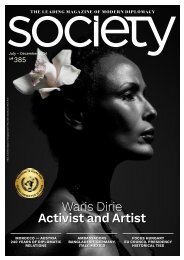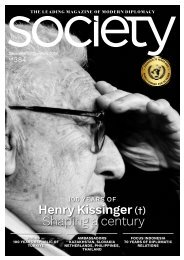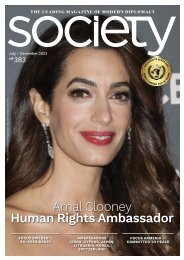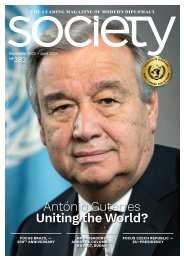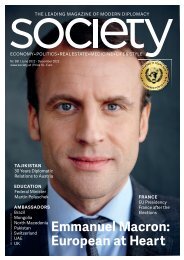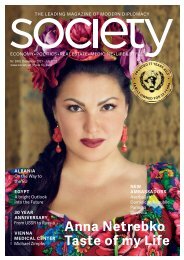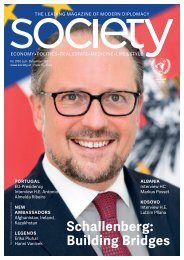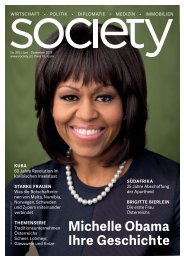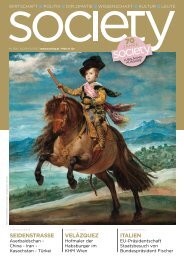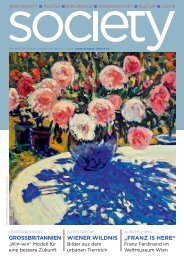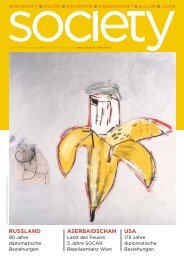Society 363 / 2013
Erfolgreiche ePaper selbst erstellen
Machen Sie aus Ihren PDF Publikationen ein blätterbares Flipbook mit unserer einzigartigen Google optimierten e-Paper Software.
diplomatie<br />
analyse<br />
Secularism, Al Khalifa‘s<br />
way out of internal crises<br />
A de facto secular constitution which smoothly separates Islam<br />
and the State might just be something worth a trial in Bahrain<br />
to guarantee on paper equality before the law.<br />
Text: Henri Estramant<br />
W<br />
estern stereotypes<br />
of Arab society<br />
bear little resemblance<br />
to life in<br />
contemporary<br />
Bahrain. In spite<br />
of the ubiquitous cliché in European and<br />
North American media coverage lingering<br />
about the nature of the kingdom’s uprising,<br />
Bahraini society is made up of more<br />
than a Shi’a “majority” and an oppressive<br />
Sunni minority. The precise religious<br />
distribution of Sunnis and Shi’a amongst<br />
the country’s population is open to question<br />
as the last official census wherein<br />
religious identification was recorded took<br />
place back in 1941. Albeit it is understood<br />
that the bulk of Bahrain’s 1,3 million inhabitants<br />
profess the Islamic faith, the<br />
reality is far more intricate than that. The<br />
realm differs quintessentially from Saudi<br />
Arabia where social interaction takes a<br />
form that more closely approximates that<br />
of a purely tribal or male-lineage society,<br />
or from Qatar where endemic society is at<br />
the same time more homogeneous in ethnic<br />
and religious terms and more clearly<br />
differentiated into dominant and subordinate<br />
classes. Whilst sharing intricate<br />
characteristics with the other GCC states,<br />
Bahraini society distinguishes itself by the<br />
way in which cleavages based on ethnicity,<br />
class position and national origin overlap<br />
to produce a matrix of social relations<br />
unique to the islands.<br />
•<br />
A diversified demographic<br />
make-up<br />
Bahrain‘s modern pluralism is to a<br />
large extent the result of the diversified<br />
confessional and demographic make-up<br />
of the island-state, which has required -<br />
even if often reluctantly - for Shi‘as, Sunnis,<br />
Persian-Arabs - so-called Hawala - , and<br />
other religious and ethnic minorities to<br />
live and work together: not least to boost<br />
the island‘s trade. The society‘s progressiveness<br />
and openness indeed surpasses<br />
Dubai, the emirate normally labelled in<br />
the West as “liberal”. Politically the country‘s<br />
leading ideologies for several decades<br />
were Arab Nationalism and Marxism,<br />
both of which downplayed religious affiliations<br />
and thus favoured a good sense of<br />
Bahraini unity.<br />
Little attention is notwithstanding<br />
ever given to the other half (!) of the kingdom‘s<br />
societal structure, naturalised immigrants<br />
and their issue, or foreign workers<br />
without whom the Bahraini economy<br />
would collapse. Unlike their counterparts<br />
in other GCC countries, immigrants in<br />
Bahrain are more easily absorbed into the<br />
spider web of society; for the latter is not<br />
so profoundly rooted in family lineage<br />
as it is in Qatar, Saudi Arabia, or Kuwait.<br />
These migrants are also eligible for welfare<br />
benefits such as free healthcare and<br />
education. One often overseen story of<br />
success is the one of Bahrain‘s recently accredited<br />
ambassador to St. James‘s Court,<br />
Alice Thomas Saaman, who since December<br />
2011 is King Hamad II‘s power woman<br />
in the British capital. She is the daughter<br />
of Syrian, Christian immigrants. An unmarried<br />
Christian herself, she became the<br />
Arab world‘s first woman to chair a parliament<br />
when in 2005 she took over the lead<br />
over Bahrain‘s Shura Council, or Upper<br />
Consultative Council.<br />
Yet another “bold move” from Bahrain‘s<br />
government which went against stereotypes<br />
was the surprising appointment<br />
of a Jewish woman to head Bahrain‘s most<br />
important diplomatic post in Washington<br />
D.C. in 2008. Ambassador Houda Ezra<br />
Ebrahim Nonoo has proven to be a skilful<br />
diplomat, joggling many balls whilst<br />
walking on a tightrope and facing a lot of<br />
unsympathetic grimaces for the regime<br />
she represents.<br />
•<br />
The Constitution<br />
of Bahrain<br />
Labelled as an apartheid regime, Bahrain<br />
would do well by implementing a<br />
secular state solution which in the longrun<br />
might foster social cohesion by ignoring<br />
private religious beliefs in the public<br />
sphere whilst also guaranteeing equality<br />
before the law, and the dismantlement of<br />
sectarianism based upon the bifurcation<br />
between Shi‘as and Sunnis.<br />
The kingdom‘s 2002 constitution<br />
stipulates in its article 2: The religion of<br />
the State is Islam. The Islamic Shari‘a is a<br />
principal source for legislation. Though<br />
its article 22 also guarantees freedom of<br />
conscience and religion, this does nothing<br />
to change the hegemony of Islam and<br />
Shari‘a in a country which is home to a<br />
sizeable number of Christians, Buddhists<br />
and Hindus as working residents amounting<br />
to about 49.3 per cent of the overall<br />
population. The inflexibility of an Islamic<br />
state in Bahrain is evident when considering<br />
that Shari‘a canon law is applied by<br />
judges in accordance to the religious affiliations<br />
of the individuals concerned in<br />
a case rather than by a uniform family<br />
or property code for all citizens and residents.<br />
Not to speak of the fact that Shari‘a<br />
judges tend not to be auspicious or sympathetic<br />
to women‘s equality before the law,<br />
even if the latter is equally enshrined in<br />
the constitution.<br />
A de facto secular constitution which<br />
smoothly separates Islam and the State<br />
might just be something worth a trial in<br />
Bahrain. First of all, it would truly guarantee<br />
on paper equality before the law<br />
for Muslims regardless of their sectarian<br />
affiliation, but likewise for non-Muslims<br />
or non-believers. From a political point<br />
96 | <strong>Society</strong> 1_<strong>2013</strong>




